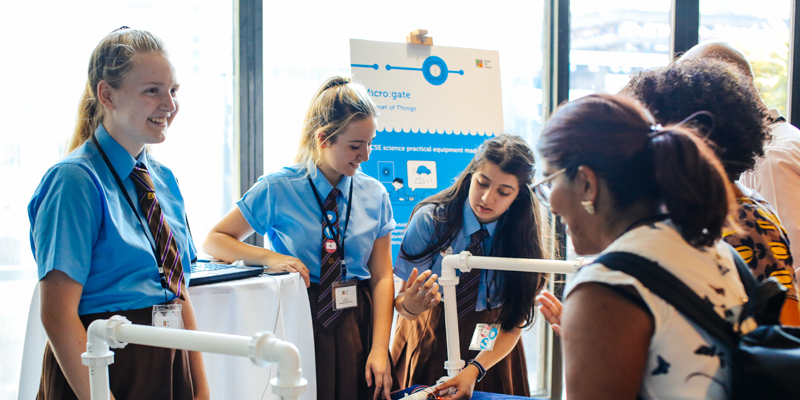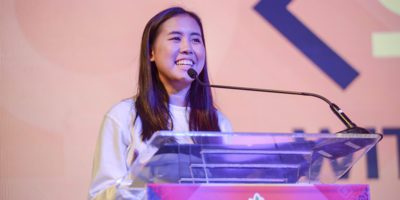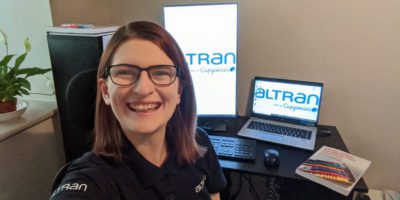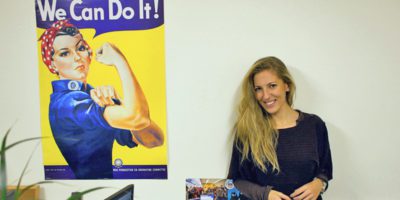Heather Picov is the CEO of Apps for Good, a global technology education charity that is growing a generation of digital social leaders. Heather has been part of Apps for Good since 2013, having previously been its head of communications and communities, and UK managing director. Before that, Heather was a policy advisor to the Government of Ontario, and co-director of the Museum of Architecture, a charity dedicated to stimulating growth in the architectural industry.
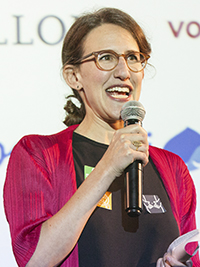
“We know that diverse teams build better, more ethical products, so we need a truly diverse, representative, and inclusive technology industry. To build that pipeline, we must reach both girls and boys and young people of all backgrounds.”
From Toronto to tech

I went to the University of Toronto with the goal of studying medicine (which in Canada is a graduate programme) but changed my mind after my first year. I graduated with a BSc degree, but I still wasn’t sure what I wanted to do, nor was I clear what I could do.
I tried different jobs and sectors early in my career. The thread running through much of what I did was communications, strategy, and social innovation, which led me to Apps for Good in 2013.
I interviewed for a business development role there, which I didn’t get. But the day after my interview I was invited to meet the then COO, Debbie Forster, and was offered a short-term contract position to run an event. While in itself it wasn’t a job I wanted, I really wanted to work at Apps for Good, so I decided to go for it. From there, things clicked for me: I loved the people, how the organisation was run and the mission.
After the event, I was offered a permanent position leading marketing and communications and soon joined the senior team. I was given a lot of support, encouragement and mentoring to learn on the job, and had the opportunity to take a leading role as we expanded in the UK and globally. In 2016, I was appointed managing director and became CEO when the founder left in 2019.
In addition to my CEO post, I’m governor for a school in London, Laycock Primary School, in Islington. They are a wonderful school that believes in the potential of every student, and have a truly inclusive approach, particularly as they have a large provision for deaf students integrated into the school.
Awareness raising and helping more young people
As chief executive of a small team, my role straddles long and short-term strategy, planning and management, and hands-on projects. An average day might involve a team-wide meeting to discuss our priorities for the week and one-to-one meetings with senior team members to discuss their team’s work in more detail, such as how they are progressing towards their goals and what barriers or challenges they are facing.
I may have a meeting with a funder to discuss future plans, and I’m constantly on the lookout for opportunities to raise awareness of our work and help more young people that need our support, such as through our new partnership with Football Beyond Borders.
The Apps for Good mission
At Apps for Good we want to unlock the confidence and talent of young people and empower them to use technology to make a difference for themselves, their community, and the wider world. We help young people learn the skills they need to thrive, such as problem-solving, teamwork and digital skills, building their confidence and resilience.
Education has been narrowing, with too great a focus on exams that often aren’t fit for purpose. Most young people are leaving school without the skills they need for work, life, and citizenship. We need a diverse tech sector, one that solves problems for everyone. Most of the students we work with come from disadvantaged backgrounds and 50% are girls.
Creating technology products is a good, contemporary way for us to ground students’ learning in the real world and make this attractive to students. Students aren’t just being told to learn something because a teacher or parent says, ‘it’s important’. Students aren’t reproducing known solutions to known problems.
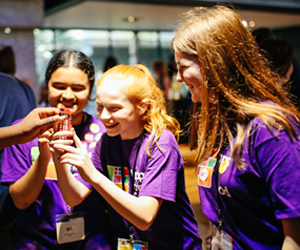
Time to reflect
COVID-19 has brought major disruption in the education sector, with remote and hybrid learning being used extensively around the world, often for the first time. While we were in a good place to adapt to this, we have had to constantly innovate to support teachers and young people.
- We created a self-paced home study version of our most popular courses to reach young people during lockdown.
- We made upgrades to our courses, such as new video content, to make hybrid and remote teaching easier for teachers.
- We also created ‘unplugged’ versions of our courses; many schools have had to restrict access to computer suites, prioritising exam years, so many teachers are having to teach the computing curriculum without access to computers.
A core part of our work has always been to connect young people with industry volunteers, regardless of where they are. For example, one of the schools we work within Wick, Northern Scotland, has brought in volunteers remotely from places such as Glasgow, London, and the USA to give students feedback on their work and deepen the learning experience.
This year, we’ve expanded this approach due to the logistical and safeguarding requirements of home learning, creating an online mentoring tool that allows students to get feedback on their projects asynchronously. Teachers, students, and volunteers have loved it and valued the flexibility, so it’s something we’ll continue to build on.
Schools, parents, and young people have all made heroic efforts over this last year. It’s been incredibly challenging, but also a chance for reflection for many. There is a movement building to drive change in education, from parents themselves who have had a much closer look at what their children are doing in school, through to voices from organisations such as EDUCATE at UCL, Edge Foundation and Big Change.
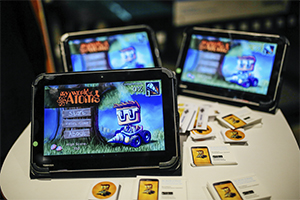
Working alongside Super Being Labs
Our technology platform has always formed the backbone of what we do. It’s how we reach teachers, engage our volunteers, and help motivate students. We’ve tried a number of approaches to building our offer in a lean and agile way, and have found that having a permanent product manager working alongside an external digital agency is the right mix for us in terms of cost, flexibility and expertise.
Therefore, we started working with Super Being Labs a few years ago, following a service design and technology review led by Noam Sohachevsky of SIDE Labs. Noam helped us create a much more flexible and lower-cost approach, and Super Being Labs was a perfect partner to work alongside us for this technology refresh, and have stayed on board to provide ongoing flexible support as we continue to build and improve our service.
They bring technical knowledge as well as expertise in service design and innovation and share our values for social change and education.
The power of technology to change and improve lives
As we look to the future, what we do is needed now more than ever. There is a growing body of evidence that young people face long-term structural changes in the labour market due to COVID-19, which could widen inequalities even further without support to improve skills for the jobs available.
In terms of lost earnings and damage to employment prospects, it’s forecast to be £14.4 billion over just the next seven years.
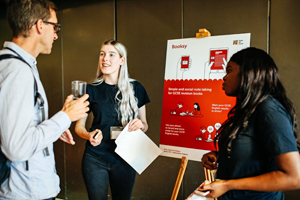
Technology is everywhere, and the pandemic has shown us the power of technology to change and improve lives; it’s through technology that many of us have been able to carry on working at home and connect with friends and family. Technology has driven many of the solutions to the pandemic, whether that’s signing up for a vaccine appointment or distributing supplies where they are most needed.
While young people need technology skills, we don’t need an army of engineers. Instead, we need all young people to learn how to apply technology to solve a problem. This is what many future jobs will involve.
It’s also how we’ll drive social and environmental change. We know that diverse teams build better, more ethical products, so we need a truly diverse, representative, and inclusive technology industry. To build that pipeline, we must reach both girls and boys and young people of all backgrounds.
Transitioning into tech roles
If you want to get into tech but you don’t come from a conventional tech background you can look for lateral moves within your existing organisation. We’ve had four people at Apps for Good transition from non-technical roles into product manager positions while working for us, going on to positions at organisations such as the Government Digital Service.
They used their existing expertise and transferable skills and sought opportunities we had for technical roles, took part in training courses, and learned on the job, building up enough skills, experience, and confidence to take the next step in their career.
Take advantage of free, subsidised, and online courses. There are many organisations providing free or supported courses, particularly targeted at women and girls, such as the Institute of Coding, Code First Girls and Tech Returners.
Also look at in-house initiatives such as Sky’s Get into Tech, which is a fantastic programme for those with little or no background in tech. Tech Talent Charter has an extensive list of training and job opportunities specifically for those without a tech background as part of their Doing it Anyway campaign.
Find support networks, look for a mentor, and don’t be afraid to ask for help. There are a number of organisations and networks where you can make connections such as Ada’s List, We Are Tech Women, Tech London Advocates and #techmums, as well as Womanthology, of course!
Using tech to help tackle the climate emergency
Moving forward, we’re developing a new programme for young people around the climate emergency. This is the most pressing issue we face globally, and young people are already leading the way in raising awareness and driving action. They have the creativity and energy to make a difference, so we want to arm them with the tools and support they need to shape the future.
This new offer will be based on our existing methodology which will see young people learn about the climate emergency and build solutions to tackle it, which could be campaigns, community action, technology solutions, or new sustainable business ideas. The aim will be to improve young people’s skills and confidence, empower them through action, and improve their well-being.
https://www.linkedin.com/in/heather-picov/

